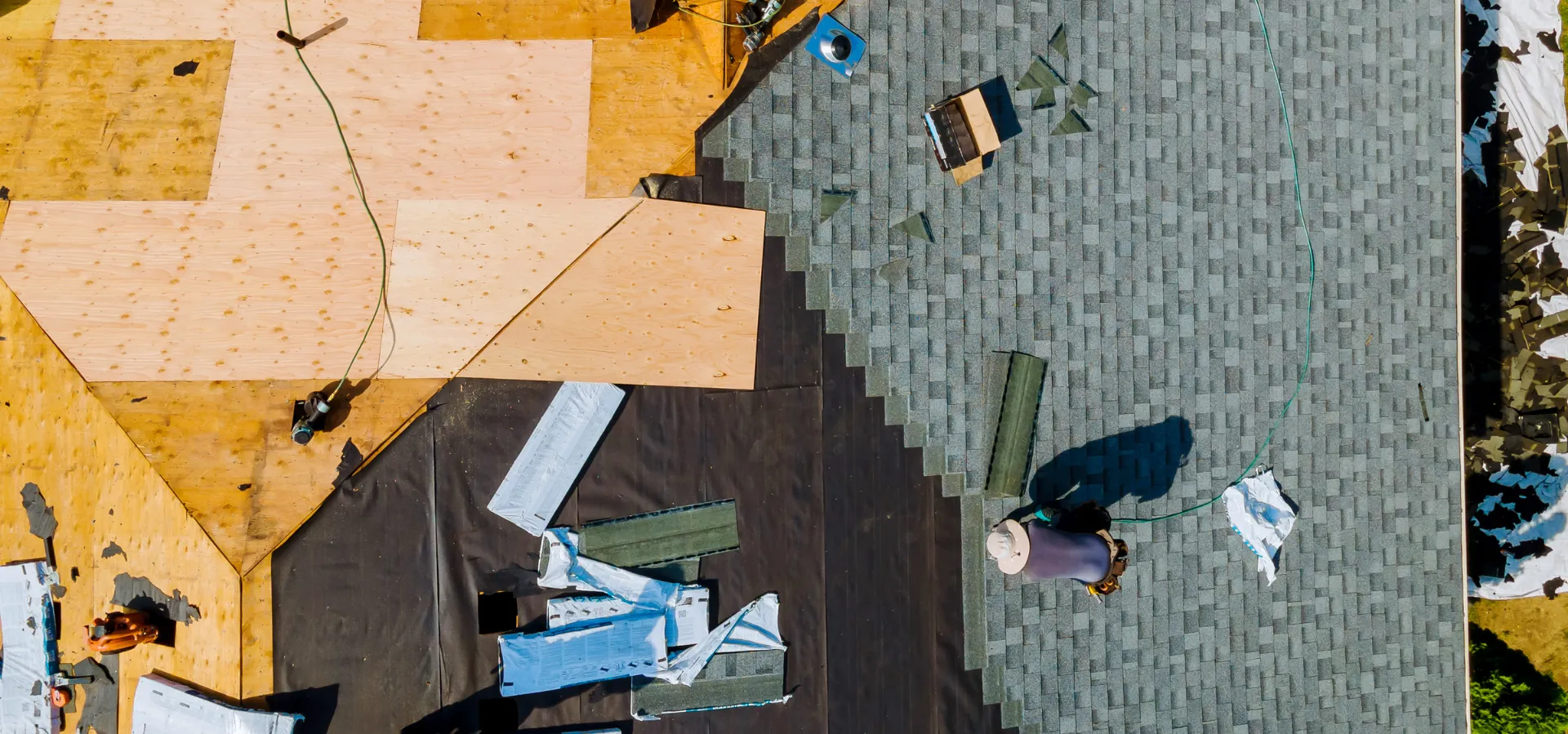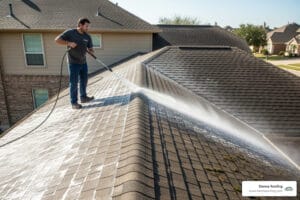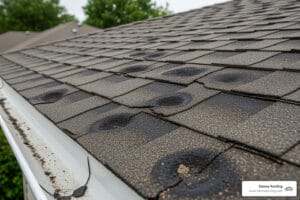Wondering how much does it cost to replace 1000 sq ft of roof? On average, a full roof replacement ranges from $4,750 to $10,000. This guide will break down costs by material type and highlight key factors influencing the price to help you plan your budget.
Key Takeaways
- Replacing a 1,000 sq ft roof costs between $4,750 and $10,000 on average, depending on material and labor.
- Factors like roof pitch, accessibility, and needed permits can significantly affect the overall replacement costs.
- Choosing the right contractor and timing your project strategically can help save money on roof replacement.
How Much Does It Cost to Replace 1000 Sq Ft of Roof?
The cost to replace a roof encompassing 1,000 square feet can vary widely depending on factors such as the choice of roofing materials, labor charges, and any necessary permits or inspections.
Homeowners may expect to spend between $4,750 and $10,000 for a complete roof replacement. The national average roof replacement cost hovers around $9,072, which helps in determining the overall expense. It’s common for many homeowners to end up spending closer to the upper limit of about $10,000 in total.
Different roofing materials carry distinct price points.
- Entry-level asphalt shingles might start at approximately $7,500 for a 1,000 sq ft area.
- Premium options like clay tiles could escalate prices up to an approximate value of $30k.
- Metal roofs are another option with costs varying from roughly $6k-$30k based on the specific metal chosen.
Roof cost can differ significantly based on geographic location, roof features, and specific house attributes, such as size and complexity. Additionally, understanding how specific elements like materials and structural features can impact total roofing costs is crucial.
These prices span across wide margins due primarily because each material offers its own unique attributes alongside varying degrees of complexity when installing them onto rooftops alike!
Cost fluctuations are influenced by myriad elements including but not limited to one’s selection among available types for which they wish to install atop their domicile – along with additional outlays attributed to skilled workmanship incurred during installation process plus applicable fees associated local ordinances & safety evaluations necessary prior commencement thereof.
Gaining insight into these determining factors enables better financial forecasting allowing individuals adequately prepare fiscally ahead time before undertaking said project(s).
Introduction
Replacing a new roof not only improves the visual appeal of your home, but also substantially boosts its market value and energy efficiency. Observing neighborhood trends, such as many neighbors getting new roofs, can be a good indicator that it might be time to assess your own roof. Additionally, understanding the lifespan of new roofs and the factors affecting their durability is crucial.
Nevertheless, the endeavor of getting a new roof is typically costly, necessitating thorough consideration of multiple aspects such as funding methods, labor expenses, and any other necessary repairs. The necessity for replacing roofs often becomes evident with aging or after sustaining damage from severe weather conditions.
It’s crucial to detect symptoms of deterioration in your roofing or surges in energy expenditures since these are telltale signs that you may need a roof replacement. This guide provides an exhaustive breakdown of costs associated with roof replacements along with actionable advice designed to help ensure that you get the most out of this significant investment.
Asphalt Shingle Roof Costs
Asphalt shingle roofs are a widely preferred roofing material in the United States, valued for their cost-effectiveness and simplicity of installation. There are different varieties of asphalt shingles, including 3-tab, architectural, and luxury shingles, each offering varying levels of durability, cost, and aesthetic options. Typically, the expense to replace an asphalt shingle roof covering 1,000 sq ft fluctuates between $4,750 and $10,000. Most homeowners tend to spend close to the higher end at around $10,000. The base price for materials required in such undertakings is estimated between $1,500 and $2,000.
Initiating an asphalt shingle installation over a span of 1,000 sq ft may begin with costs hovering around $7.50 per sq ft or roughly total up to at least $7,500 overall. Several elements can adjust this ballpark figure—these include your choice of standard or architectural shingles which offer increased longevity and visual appeal but come with a heftier price tag along with varying labor charges as well as possible fees associated with permits or inspections that might be necessary.
Despite occasionally encountering elevated expenses linked specifically to certain types of asphalt shingles like architectural ones—they sustain their position as an economically viable selection due largely in part because they facilitate straightforward installations coupled with modestly priced materials thus maintaining their popularity across various regions nationwide.
Metal Roof Costs
Metal roofs are recognized for their long lifespan and durability. They also offer energy efficiency benefits. The cost to replace a 1,000 sq ft roof with metal roofing can range from $6,000 to $30,000, depending on the type of metal used. Aluminum roofing, for instance, costs between $6.50 and $21 per square foot when installed.
Different types of metal roofs come with varying price tags. Galvanized steel roofing installation ranges from $4.50 to $17 per square foot, while zinc panels, known for their corrosion resistance, cost about $14.50 to $21 per square foot. Copper, one of the most luxurious options, can cost around $20 to $40 per square foot.
Installation costs for metal roofs vary based on metal type and project complexity. While the initial investment is higher, metal roofs often last 40 to 50 years with proper maintenance, making them a valuable long-term investment.
Tile Roof Costs
Roofs adorned with tiles, crafted from clay or concrete materials, are renowned for their distinctive visual charm and robustness. For the replacement of a tile roof encompassing 1,000 square feet, homeowners may encounter expenses ranging from $8,000 to $20,000. These costs vary based on the selected tile type as well as the accompanying installation fees. Clay tiles can cost anywhere between $3 to $7 per square foot solely for materials, while comprehensive costs that factor in installation might reach upwards of $8 to $24 per square foot.
Choosing concrete tiles can offer a more budget-friendly option yet still come with substantial expenditure. The material costs for such tiles. Fall within the range of $2 to $4 per square foot and when considering installment charges too, prices escalate up to an expanse spanning from $9 to $20 per square foot. Tile roof installations are known for being meticulous endeavors that sometimes necessitate extra structural reinforcements hence hiking up overall expenses.
Clay and concrete tile roofs boast immense longevity potentially enduring over 100 years given they receive appropriate maintenance making them not only aesthetically pleasing but remarkably durable – traits which heighten their appeal among property owners seeking roofing solutions that effortlessly blend allure and endurance.
Slate Roof Costs
Slate roofs are acclaimed for their stunning natural appearance and outstanding longevity. Replacing a slate roof of 1,000 sq ft will incur costs ranging from about $6,000 to $15,000 when opting for natural slate materials. On the other hand, synthetic alternatives may come with prices between $12,000 and $30,000. One of the primary reasons behind these high expenses is the need for skilled labor specialized in installing such roofs. This expertise can cost approximately $50 to $100 per hour.
Numerous elements have an impact on the final expense associated with installing slate roofing. The design’s intricacy as well as its slope and overall shape play substantial roles in determining cost. Despite necessitating a greater upfront investment than many other types of roofing materials available on the market today – slate roofs provide enduring beauty that stands strong throughout time – potentially lasting beyond 100 years, which presents them as a compelling option among those desiring premium-quality roofing solutions.
Flat Roof System Costs
Flat roofs are a popular choice for both commercial and certain residential buildings. The replacement cost for a flat roof spanning 1,000 square feet can vary from $3,000 to $11,000 depending on the material selected. For instance, EPDM roofing has a price range of $4 to $10 per square foot, which equates to an overall expense of between $6,200 and $16,000 for an entire 1,000 sq ft roof.
Flat roofing materials offer several options, including TPO, PVC, and built-up roofing systems. TPO roofing typically costs between $4 and $10 per square foot, while PVC ranges from $5 to $12 per square foot. Built-up roofing, made from tar and gravel, is another choice, with prices around $3.50 to $7.50 per square foot. For a 1,000 square foot area, this results in a total installation cost ranging from $3,500 to $7 per square foot.
Considering their affordability, flat roofs stand out as an economic solution favored by many owners across different properties.
Factors Affecting Roof Replacement Costs
The total expense of a roof replacement project is affected by multiple elements. For example, approximately 60% of the comprehensive costs associated with replacing a roof can be attributed to labor charges. In some cases, roof repair may be insufficient, making it crucial to know when a full roof replacement is necessary. The intricacy of the structure, such as its dimensions and characteristics, has a notable effect on the ultimate cost for replacement. Understanding the investment value when replacing a roof can help ensure homeowners receive the best value for their expenditure.
Selecting an appropriate material for roofing is vital since it significantly impacts overall expenses incurred in the replacement process. Factors like the incline and ease of access to your roof may affect labor expenditures owing to necessities related to safety gear. Being aware of these aspects can assist homeowners in forming a more accurate projection of their roofing project’s aggregate cost.
Labor Costs
The expense of labor accounts for a substantial portion of the total cost to replace a roof, typically constituting roughly 60% of the entire replacement cost. On average, the roofing installation can set homeowners back between $150 and $300 per square foot, with prices fluctuating from $3,000 to as much as $7,000 depending on both quality considerations and job complexity. It’s imperative that homeowners have an accurate understanding of these costs when planning their budgets.
Local economic factors along with varying levels of expertise among roofing contractors may affect labor pricing. Contractors who possess greater experience might command higher fees. Their proficiency is crucial in ensuring that roofs are installed correctly—a vital aspect in averting water ingress and maximizing roof durability.
Permits and Fees
Additional expenditures such as permits and fees can have a notable impact on the total budget for a roofing project. The expense of building permits necessary for most roof replacements falls between $250 to $1,000, although they can be anywhere from $100 up to $1,400.
Compliance with local regulations and homeowners association (HOA) stipulations might increase overall costs because some HOAs charge extra fees or mandate approval for particular roofing designs. It is crucial to factor these obligatory permit expenses into your financial planning when preparing for a roofing project so that you are not caught off guard by unforeseen charges.
Roof Pitch and Accessibility
The pitch and accessibility of a roof can significantly impact labor costs and overall roof replacement costs. Steeper roofs, for example, can incur extra costs of $1,000 to $3,000 due to the increased risk and difficulty of installation.
Roof accessibility can impact labor time and costs, especially in challenging urban settings. More intricate roof designs and complex structures may also require additional labor and safety equipment, further driving up the total replacement cost.
Knowing these factors aids in better financial preparation for your roofing project.
Geographic Location
The cost of roof replacement can vary significantly depending on the geographic location. Different regions have unique climate conditions, building codes, and labor costs, all of which can impact the overall cost of the project. For instance, areas prone to hurricanes or wildfires may require more expensive roofing materials and labor to ensure the roof can withstand extreme weather conditions.
In general, the cost of roof replacement tends to be higher in urban areas and lower in rural areas. This is because urban areas often have higher labor costs and more stringent building codes, which can drive up the cost of the project. Here are some examples of how geographic location can impact the cost of roof replacement:
- Coastal areas: $8,000 to $15,000
- Mountainous areas: $7,000 to $14,000
- Urban areas: $9,000 to $18,000
- Rural areas: $6,000 to $12,000
It’s essential to get quotes from local roofing contractors to get a more accurate estimate of the cost of roof replacement in your area. By understanding how geographic location affects roof replacement costs, homeowners can better plan and budget for their roofing projects.
Additional Costs to Consider
When preparing for a roof replacement, it’s important to be mindful of possible extra expenditures. These might consist of the price for conducting a roof inspection once the new roofing is in place, averaging approximately $240, along with charges associated with removing and discarding previous roofing materials.
The final cost can also be influenced by various aspects such as where you live, how large and intricate your roof structure is, and which specific roofing material you select. Homeowners should set aside funds for unforeseen add-ons like replacing a chimney or meeting certain requirements imposed by homeowners association guidelines that could increase the overall expense.
Old Roof Removal
The process of replacing a roof obliges one to first remove the existing structure, which incurs specific expenses. On average, the cost for removing and installing a new roof varies between $1,000 and $1,500 depending on job complexity. The laborious task of shingle removal demands meticulous attention as well as proper disposal methods. This is instrumental in determining the total replacement costs.
When planning your budget for a roof replacement project, it’s important to consider extra expenditures related to old roof removal such as clearing up debris post-removal, disposing materials appropriately or perhaps securing a dumpster rental if dealing with an extensive project. These additional costs are essential components that ensure your roofing endeavor proceeds without hitches.
Structural Repairs
During the process of replacing a roof, especially on older structures, it’s common to encounter the need for structural repairs. The expenses associated with fixing damaged structural elements can vary widely and are expected to be in the range of $364 to $1,556. In instances where severe damage has occurred and timber needs replacement, costs might escalate from $1,000 up to as much as $10,000 based on how extensive the damage is.
The possibility of degradation necessitates setting aside a more substantial repair budget when dealing with older roofs. This underscores why conducting an exhaustive evaluation of the existing roof before undertaking its replacement is critical. Anticipating these potential repairs through careful planning and allocation of funds can prevent unforeseen expenditures throughout the course of your roofing project.
Cleanup and Disposal
The process of replacing a roof necessitates not only the installation but also the removal and proper disposal of old roofing materials, which entails extra work and expenses. Contractors handling roofing may levy charges for this service, with fees fluctuating based on the volume of waste produced.
Adherence to state and local laws governing hazardous substances might impact the method of disposal, possibly increasing total costs. To guarantee an untroubled and legal execution of their roof replacement project, homeowners should allocate funds for these supplementary expenditures.
Calculating Roof Replacement Cost
Calculating the cost of roof replacement can be a complex process, but it can be broken down into several key factors. Here are the steps to calculate the cost of roof replacement:
- Determine the size of the roof: Measure the length and width of the roof to calculate the total square footage.
- Choose the roofing material: Select the type of roofing material you want to use, such as asphalt shingles, metal roofing, or tile roofing.
- Calculate the cost of materials: Multiply the total square footage of the roof by the cost of the roofing material per square foot.
- Calculate labor costs: Multiply the total square footage of the roof by the labor cost per square foot.
- Add additional costs: Add any additional costs, such as permits, inspections, and disposal fees.
- Calculate the total cost: Add the cost of materials, labor costs, and additional costs to get the total cost of roof replacement.
Here’s an example of how to calculate the cost of roof replacement:
- Roof size: 2,000 square feet
- Roofing material: Asphalt shingles ($3.50 per square foot)
- Cost of materials: 2,000 square feet x $3.50 per square foot = $7,000
- Labor cost: 2,000 square feet x $2.50 per square foot = $5,000
- Additional costs: $1,000
- Total cost: $7,000 + $5,000 + $1,000 = $13,000
By following these steps, homeowners can get a clearer picture of the potential expenses involved in their roof replacement project and plan their budget accordingly.
DIY Roof Replacement vs. Hiring Professionals
When debating the decision to personally undertake a roof replacement or engage professional roofing contractors, it’s critical to consider both the risks and advantages. Opting for a DIY approach might appear financially beneficial at first glance, but there’s an inherent risk of safety concerns and unforeseen costs that may arise. Expenses associated with do-it-yourself efforts could encompass acquiring or leasing specialized tools, necessary protective gear, as well as potential healthcare expenses in case of injuries.
Conversely, enlisting seasoned roofing contractors guarantees craftsmanship of high quality while minimizing hazards. Such experts come equipped with not just extensive experience, but also appropriate tools and skills essential for handling intricate roof replacement endeavors efficiently. Utilizing professionals can safeguard against invalidating warranties and help ensure insurance claims are upheld.
In essence, although doing it yourself may seem budget-friendly upfront, the sustained advantage and peace of mind offered by employing skilled professionals typically surpass these initial financial considerations.
Tips to Save Money on Roof Replacement
It’s feasible to cut costs on a roof replacement through careful planning and judicious decision-making. Arranging the replacement during the autumn or winter can lead to savings, as roof replacement costs tend to dip due to lesser demand during these seasons. Securing quotes from three to five different roofing contractors could facilitate competitive pricing and present various choices.
While evaluating estimates for your roofing project, take into account aspects such as warranty offerings, the quality of roof material proposed by each contractor, and their level of expertise in order to maximize value for your expenditure. Opting for materials that provide both durability and cost-effectiveness, meticulously budgeting for the project ahead of time, and choosing an opportune moment can all substantially diminish overall replacement costs.
How to Choose the Right Roofing Contractor in Houston, Texas
Selecting an adept roofing contractor in Houston, Texas requires attention to various essential elements. It is crucial to choose a professional with at least ten years of experience, which reflects their consistency and the excellence of their work. Obtaining a minimum of three references from prior customers will shed light on the reliability and craftsmanship quality of the contractor.
Recommendations from relatives or acquaintances can prove extremely beneficial as well. Verify that your chosen contractor supplies diverse premium-quality roofing materials and offers an extensive warranty—both are signs they stand behind their labor and resources used.
By conducting diligent research and careful examination, you can secure a trustworthy contractor for undertaking your roofing venture.
Does Replacing a Roof Increase Home Value?
Replacing a roof can increase the value of a home, but the extent of the increase depends on several factors. Here are some factors to consider:
- The condition of the existing roof: If the existing roof is damaged or leaking, replacing it can significantly increase the value of the home.
- The type of roofing material: Upgrading to a higher-quality roofing material, such as metal roofing or tile roofing, can increase the value of the home.
- The age of the home: Replacing a roof on an older home can increase its value, especially if the new roof is more energy-efficient and durable.
- The location of the home: Replacing a roof in a desirable location, such as a coastal area or a mountainous region, can increase the value of the home.
According to the National Association of Realtors, replacing a roof can recoup up to 80% of its cost at resale. However, this can vary depending on the location and condition of the home. Here are some examples of how replacing a roof can increase home value:
- Asphalt shingle roof: 5% to 10% increase in home value
- Metal roof: 10% to 20% increase in home value
- Tile roof: 15% to 30% increase in home value
By investing in a new roof, homeowners can not only enhance the aesthetic appeal and functionality of their home but also potentially increase its market value.
Explore Homeowners Insurance Claim Options
If you’re considering replacing your roof, you may want to explore homeowners insurance claim options. Here are some steps to take:
- Review your policy: Check your homeowners insurance policy to see if it covers roof damage or replacement.
- Document the damage: Take photos and videos of the damaged roof to document the extent of the damage.
- Contact your insurer: Reach out to your insurance company to report the damage and initiate the claims process.
- Get a quote: Get a quote from a roofing contractor to repair or replace the roof.
- Submit the claim: Submit the claim to your insurance company, including the quote and documentation of the damage.
Here are some examples of homeowners insurance claim options:
- Roof damage from a storm: $5,000 to $10,000
- Roof damage from a tree branch: $2,000 to $5,000
- Roof replacement due to wear and tear: $8,000 to $15,000
Keep in mind that homeowners insurance policies may have exclusions or limitations for roof damage or replacement, so it’s essential to review your policy carefully and consult with your insurer before initiating the claims process. By understanding your insurance options, you can potentially offset some of the costs associated with roof replacement.
Partner With Sienna Roofing & Solar
Sienna Roofing & Solar, LLC stands as a premier authority on roof replacements within the Houston, Texas vicinity. Their expertise spans over ten years and caters to both the residential and commercial sectors, offering an array of services that include thorough roof inspection, consistent maintenance, and responsive emergency aid. The firm pledges uncompromising quality and client satisfaction with their assurance of 100% satisfaction.
Tailoring roofing solutions to meet individual preferences is what Sienna Roofing & Solar excels in—each project imbued with a distinct personal flair. For those interested in obtaining a free estimate, you can reach out by dialing (832) 564-3322 or by visiting them at their office location: 2400 Central Parkway Suite J, Houston, TX 77092.
Summary
Grasping the intricacies of roof replacement costs is vital for homeowners embarking on a roofing project. The final budget will be shaped by various elements such as material selection, labor expenses, permit fees, and other unforeseen charges. Factors to consider that affect pricing include the slope of your roof (roof pitch), ease of access to it, and whether structural repairs are necessary during your roofing venture.
Collaborating with an esteemed contractor like Sienna Roofing & Solar can offer both high-quality outcomes and tranquility throughout the process. Their dedication to customer satisfaction coupled with their proficiency in this field positions them as a trustworthy option for any roofing undertakings you may have. Make a sound investment in your property by opting for premium materials and skilled professionals who can deliver a robust yet visually appealing rooftop.




